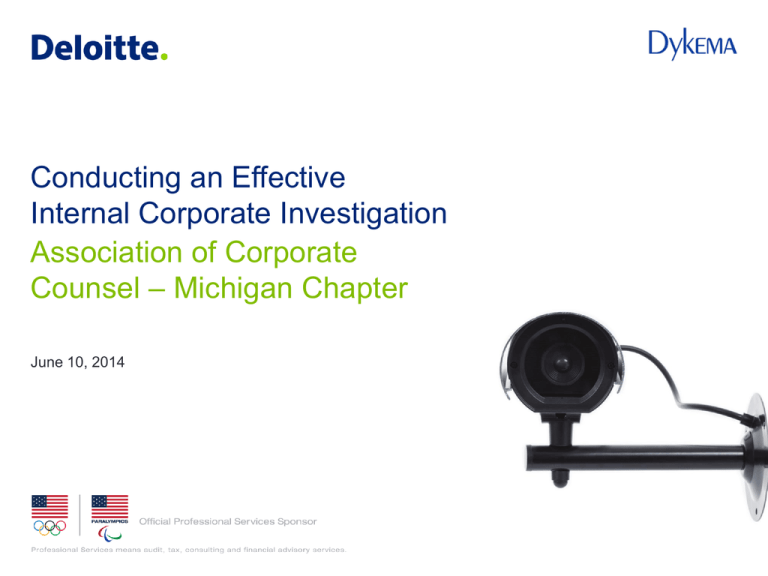
Conducting an Effective
Internal Corporate Investigation
Association of Corporate
Counsel – Michigan Chapter
June 10, 2014
Welcome
Your presentation team
Rex E. Schlaybaugh, Jr.
Member and Chair Emeritus
Dykema Gossett LLP
Bloomfield Hills, MI
Moderator
Robert T. Biskup
Director, Forensics
Deloitte Financial Advisory Services LLP
Detroit, MI
Speaker
Brian M. Moore
Member
Dykema Gossett LLP
Bloomfield Hills, MI
Speaker
2
Copyright © 2014 Deloitte Development LLC. All rights reserved.
Introduction
Why we are here today
• Circumstances / issues giving rise to internal investigations
− Cyber-attacks on data / network security
− Corporate fraud / bribery and corruption
− Whistleblower rights
− Anti-competition activities
− Product safety / quality control
− Financial reporting / accounting irregularities
• Regulatory environment (Dodd-Frank, SEC, DOJ Leniency Programs, SOX)
− Invites, if not demands, investigations as part of regulatory response protocol
− Credits independent investigations as important part of cooperation and a key
element in reducing corporate liability
− Regulators and investors expect independent directors and external advisors
to lead investigations where circumstances warrant
3
Copyright © 2014 Deloitte Development LLC. All rights reserved.
Introduction
Why we are here today
• Benefits of an effective internal investigation
− Memorializecompany’sgood-faith response
− Trigger remedial action; enhancement to policies, procedures, internal controls
− Better to know and, if warranted, voluntarily disclose
− Minimize potential consequences, penalties, liabilities, debarments
• Triggers warranting an investigation
4
− Financial fraud
− Whistleblower complaints
− Misconduct by corporate officers or
employees
− Calls to hotline or anonymous
reports
− Ethical issues
− Media report
− Conflicts of interest
− Regulatory noncompliance
− Government search warrant,
subpoena or CID
− Any allegation creating significant
risk or potential for derivative lawsuit
Copyright © 2014 Deloitte Development LLC. All rights reserved.
Introduction
Why we are here today
• All internal investigations are fluid, time-sensitive, and require flexibility
• Important to develop a collaborative process
• Key questions / issues to consider at the outset
− Who should lead the investigation
− Role of external counsel and advisors
− Development of a structured and collaborative process
− Role of Management and / or Board of Directors
− Impact of investigation on attorney-client privilege & work-product privileges
− Scope and plan of the investigation
− How the investigation should be conducted (document collection, internal
interviews, external interviews)
− Who should receive the end-product, and in what form
5
Copyright © 2014 Deloitte Development LLC. All rights reserved.
Who should investigate?
• Higher risk cases – investigation should be under the direction of attorneys
− HR, internal audit or compliance officer for matters involving lower risk
• Office of General Counsel
− Isolated and well-defined allegations
− Activities of lower-level employees
− Advantages: familiar with company; known to management; less disruption to
operations; cheaper
• Outside counsel
− Risk of criminal or civil exposure
− Inquiries from government agencies / regulators
− Activities of board members, management, or senior employees
− Investigation led by audit committee or special committee
− Advantages: experience and resources; maintain independence (consider new
outside counsel); additional safeguards of attorney-client privilege
6
Copyright © 2014 Deloitte Development LLC. All rights reserved.
Collaborative Process
• Role of Management / Board of Directors
− Need management support, but independent of management control to ensure
credibility
− Appoint management point person (OGC for most investigations)
− Board oversight may be necessary if management potentially implicated
− Independent of board control if activities of board members at issue
• Need for subject matter experts (SMEs)
− Forensic accountant necessary for most investigations
− Counsel should retain experts for services in connection with providing legal
advice to company (protect privilege)
− Counsel should direct their activities
7
Copyright © 2014 Deloitte Development LLC. All rights reserved.
Developing a Structured Process
• Develop matrix of incoming report categories
− Examples of violations of company policy, laws, regulations
◦ Accounting / financial reporting (potential SOX 301)
◦ Managerial frauds (potential SOX 302)
◦ Employee relations (routine HR vs. significant compliance issues)
◦ Asset misappropriation
◦ Kickbacks, collusion, bribes, corruption
◦ Anti-competition activities
◦ Data privacy
◦ Cyber attacks and data security
◦ Credit card abuse
◦ Environmental
◦ Product safety
◦ Threats to personal safety and security
8
Copyright © 2014 Deloitte Development LLC. All rights reserved.
Making it Collaborative
• For each category, develop primary and secondary leads
− Legal (OGC and external counsel)
− Compliance
− Internal Audit
− Security
− Human Resources
− Internal Control
− Information Technology
− HQ, Regional, and Local leads
− Internal Regulatory Groups
− Business Operations
9
Copyright © 2014 Deloitte Development LLC. All rights reserved.
Assembling the Right Team
• When to involve outside forensic accountants
− Accounting irregularities
− Financial reporting issues
− Asset or money tracing
− Large data gathering
− Complex structured and unstructured data analytics
− IT system implications
− International coverage
− Other support needed by counsel
10
Copyright © 2014 Deloitte Development LLC. All rights reserved.
Defining when to Escalate
• Develop specific criteria and procedures
− Allegations against senior management
− Allegations involving managerial fraud
− Allegations involving accounting improprieties
− Allegations involving financial statement fraud
− Allegations with legal / regulatory implications
− Allegations with reputational implications
− Allegations involving bribery or kickbacks
− Allegations impacting product quality
− Allegations involving potentially material internal control weaknesses
11
Copyright © 2014 Deloitte Development LLC. All rights reserved.
Defining when to Escalate (continued)
• Who needs to know?
− General Counsel?
− CFO?
− HR?
− CEO?
− Business Unit Management?
− Board of Directors or Board Committee?
− External Auditors?
− Exceptions and process for dealing with internal conflicts of interest
12
Copyright © 2014 Deloitte Development LLC. All rights reserved.
Issues Involving Officers or Board Members
• Special considerations
− Consider who must be informed in each scenario (CEO, CFO, GC, HR, CCO)
− Consider special evidence gathering protocols
− Consider administrative leave situations
− Consider external reporting requirements
− Consider involving company auditors
− Consider special investigation committee overseen by board when
independence is an issue
13
Copyright © 2014 Deloitte Development LLC. All rights reserved.
Protecting Privileges
• Investigationsconductedbycounselforpurposesofthecompany“obtaining
legaladvice”aregenerallyprotectedbyattorney-client and work product
privileges
− Typically applies to both in-house & outside counsel
− Underlying facts are not privileged
• Investigation for business purposes may not be protected
• Recent federal district court decision raises concerns whether companies can
claim privilege over investigations conducted pursuant to a regulatory or
corporate policy. United States ex rel. Harry Barko v. Halliburton Company, et al.,
No. 05-CV-1276 (D.D.C. Mar. 6, 2014)
− Impact should be limited as case sufficiently distinguishable from most
attorney-led investigations
14
Copyright © 2014 Deloitte Development LLC. All rights reserved.
Steps of an Internal Investigation
Step 1: Define Scope of Investigation
Step 2: Prepare Investigation Plan
Step 3: Collect / Analyze Data & Documents
Step 4: Conduct Witness Interviews
Step 5: Prepare Final Report
15
Copyright © 2014 Deloitte Development LLC. All rights reserved.
Step 1: Define Scope of Investigation
• Crucial to cost-efficient and effective investigation is defining the proper scope at
outset of investigation
• Defining factors
− Precise issues / allegations being investigated
− Immediate & potential audience of investigation results
− Need for subject-matter expert
− Scope of corporate involvement
− Time frame of allegations
− Identification of sources of potential evidence
− Identification of relevant witnesses (informational & target)
16
Copyright © 2014 Deloitte Development LLC. All rights reserved.
Step 2: Prepare an Investigation Plan
• Overview of the allegations & investigation scope
• Timetable for investigation events
− Collect / analyze documents
− Interview witnesses
− Preliminary reporting
• Timetable for final reporting
17
Copyright © 2014 Deloitte Development LLC. All rights reserved.
Step 3: Preserve / Collect / Analyze Data
& Documents
• Depending on scope of investigation & involvement of government / regulators
• Collect key documents immediately
− Company rules, controls, policies and procedures
− Memoranda or notes regarding allegation
− Prior complaints
− Contracts
− Personnel files
• Investigation hold memo to identified custodians
− Suspend normal document destruction policies
− Consider simultaneous imaging computer hard drives & back-up media
of key witnesses
18
Copyright © 2014 Deloitte Development LLC. All rights reserved.
Step 3: Preserve / Collect / Analyze Data
& Documents (continued)
• Document collection
− Designate IT point person to coordinate efforts
− Consider outside vendor (or retained forensic expert)
• Document review – balance cost & thoroughness
− Consider contract attorneys for large-scale reviews
• Memorialize document collection and review processes
− Formulate search criteria and parameters
− Involve government / regulators, if necessary
19
Copyright © 2014 Deloitte Development LLC. All rights reserved.
Step 3: Preserve / Collect / Analyze Data
& Documents (continued)
• Data preservation
− Email
− Hard drives
− Personal computers
− Mobile devices
− Hardcopy documents
− Local and central servers
− Consider global data protection regulations
20
Copyright © 2014 Deloitte Development LLC. All rights reserved.
Step 4: Conduct Witness Interviews
• Prepare interview outline
− Explain purpose
− Provide Upjohn instruction
− Ask witnesses about compliance with P&P
− Exhaust memory before reviewing documents
• Determine order of witnesses
− Internal informational witnesses (may define / redefine scope)
− External informational witnesses (e.g., outside auditor)
− Internal target witnesses (primary alleged target last)
• Two-person interviews
− Accurate note-taking
− Second witness to testimony
21
Copyright © 2014 Deloitte Development LLC. All rights reserved.
Upjohn Warnings
• Proper Upjohn Warnings
− Company requested counsel to gather information in order to provide legal
advice to the Company in connection with its investigation of [ __ ]
− Counsel represents the Company; not the witness
− Interview is protected by the attorney-client privilege
− Privilege belongs to and is controlled by the Company; not the witness
− Company can decide to waive the privilege and disclose discussion to thirdparties without notice to the witness
− Keep interview confidential to preserve privilege; witness may not disclose to
any third-party, including other employees or anyone outside the Company
− Any questions? Willing to proceed?
22
Copyright © 2014 Deloitte Development LLC. All rights reserved.
Step 5: Final Report
• Form of report
− Written report not always necessary or advisable
− PowerPoint presentation or oral report reduces risk of privilege waiver
• Content of written report or presentation
− Only factual findings / observations?
− Consider legal conclusions and / or recommendations
− Identify non-compliance with established policies & procedures
• Remedial actions resulting from investigation should be documented (e.g.,
personnel decisions or policy changes)
23
Copyright © 2014 Deloitte Development LLC. All rights reserved.
Disclosing Investigation Results – Impact on
Privilege
• Decision for the Client
• Outside Auditor
− May demand disclosure; require additional work
− Failure to disclose may delay audit opinion
− Disclosure risks waiver of privilege
− Split of authority; no waiver is predominate view
• Board of Directors
− Privilege preserved if board is the client
− Sharing can result in waiver if board is not the client
− Waiver if conduct of board members at issue
24
Copyright © 2014 Deloitte Development LLC. All rights reserved.
Disclosing Investigation Results – Impact on
Privilege (continued)
• Government / Regulators
− Case-by-case analysis
− Consider statutory obligations to disclose (e.g., SEC, FDA)
− Consider statutory benefits to disclose
◦ SEC2001“SeaboardReport”:consideredinassessingcooperation
◦ SEC2006”StatementonPenalties”:consideredinassessingpenalties
• Other factors
− Government already know? Eventual disclosure likely?
− Nature of disclosure; can it be limited?
− Anticipate litigation?
− Privilege waiver in most cases; assume waiver
25
Copyright © 2014 Deloitte Development LLC. All rights reserved.
Any Questions?
For further information:
Rex E. Schlaybaugh, Jr.
Dykema Gossett LLP
39577 Woodward Ave., Suite 300
Bloomfield Hills, MI 48304
(313) 568-5370
rschlaybaugh@dykema.com
Robert T. Biskup
Deloitte Financial Advisory Services LLP
200 Renaissance Center, Suite 3900
Detroit, MI 48243
(313) 396-3000
rbiskup@deloitte.com
Brian M. Moore
Dykema Gossett LLP
39577 Woodward Ave., Suite 300
Bloomfield Hills, MI 48304
(248) 203-0772
bmoore@dykema.com
26
Copyright © 2014 Deloitte Development LLC. All rights reserved.
About Deloitte
Asusedinthisdocument,“Deloitte”meansDeloitteLLPanditssubsidiaries.Pleaseseewww.deloitte.com/us/aboutforadetailed description of
the legal structure of Deloitte LLP and its subsidiaries. Certain services may not be available to attest clients under the rules and regulations of
public accounting.
Copyright © 2014 Deloitte Development LLC. All rights reserved.
Copyright © 2014 Deloitte Development LLC. All rights reserved.
Member of Deloitte Touche Tohmatsu Limited

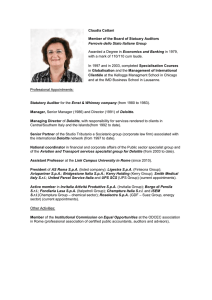
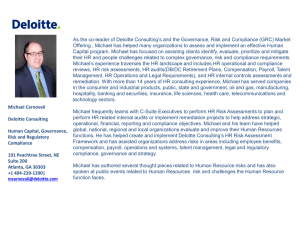
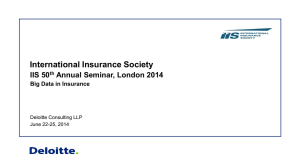
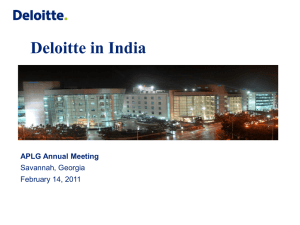
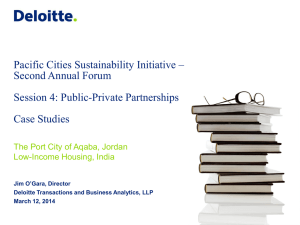
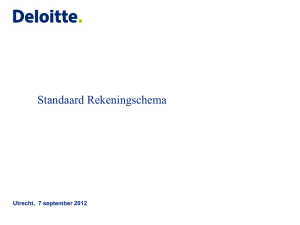
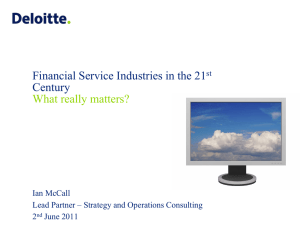
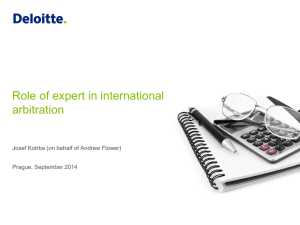
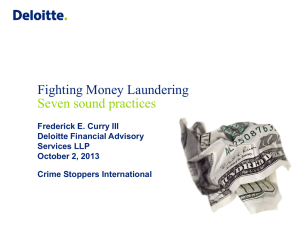
![Your_Solutions_LLC_-_New_Business3[1]](http://s2.studylib.net/store/data/005544494_1-444a738d95c4d66d28ef7ef4e25c86f0-300x300.png)